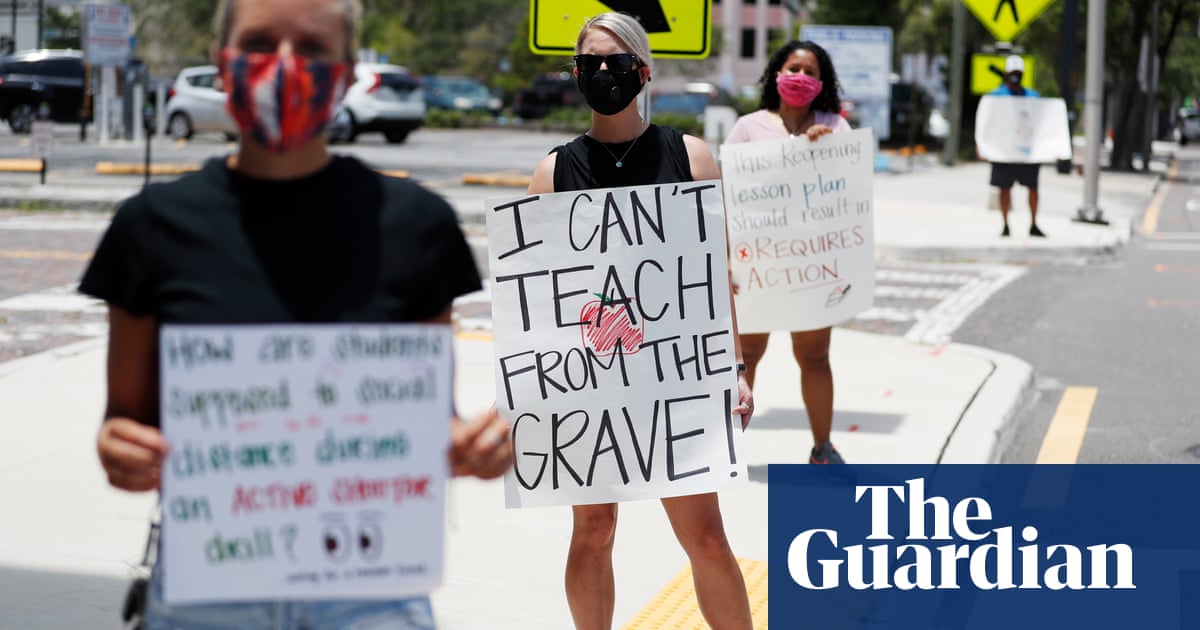
School districts in the United States will begin reopening in August, many with face-to-face classes, five days a week, despite the increase in coronavirus cases in many parts of the country.
But school reopens have teachers across the United States fearful for the safety of themselves, students, staff, and family members, and teachers and unions say adequate protections and protocols have yet to be implemented.
Some teachers have even drafted wills before school begins, others have retired from the profession, and teacher unions have said they will sanction the strike for members they feel are forced to take life-threatening risks.
“Educators are afraid because adequate policies are not being implemented to protect them,” said Alicia Priest, president of the Oklahoma Education Association. The Oklahoma state board of education only issued guidelines for school districts and rejected a proposal on July 23 to issue a mask mandate in schools across the state.
“The OAS offers members through our personal legal services program free will. Requests for these free wills have increased more than 3,000% in recent weeks, “added Priest.
A report released by the Kaiser Family Foundation on July 10 found that 1.47 million teachers in the US, about 24% of the profession, are at higher risk for serious illness if they are infected with coronavirus because they have conditions than the make them vulnerable.
However, Florida has issued an order forcing all schools to open in August in person, five days a week. The Florida teachers union responded to the order with a lawsuit.
“We are disappointing the community by pretending that we can safely open. Districts cannot do what is needed according to CDC guidelines, ”said Stacy Rene Kennett, kindergarten teacher in Immokalee, Florida, who is expected to begin attending in-person training for reopening on August 4th.
Amy Scott, an IB language arts high school teacher in Miami, Florida for 44 years, decided to retire a year earlier due to the coronavirus pandemic and the instability of the upcoming school year.
“I was afraid of it. I wanted to extend it as long as possible because I love children and teaching, “said Scott. “But then the coronavirus came and I realized all the difficulties of having brick and mortar classrooms and the danger that teachers, students, and the community faced spread and I didn’t want to finish my 45 years of teaching in such a frustrating environment. . “
In Arizona, which was designated a global access point for a pandemic in early July, reopening decisions were left to individual school districts.
“There is no consistency across the state,” said Marisol Garcia, a high school teacher and family mother in Phoenix, who currently serves as vice president of the Arizona Educators Association. “We are left with our own devices to discover how to keep our families safe and ensure that our students are safe”
Garcia explained that the current class burdens in Arizona make social distancing impossible in districts where face-to-face learning is allowed, as it had no fewer than 31 students in each class last year, and it is unclear if any schools You will face repercussions for not following the guidelines for coronavirus protections. She also cautions that many of her colleagues may retire early.
In Georgia, state agencies have issued guidelines for reopening schools, deferring decisions to school districts about when and how schools will reopen in the coming weeks.
Several school districts outside of Georgia metropolitan areas are reopening in August with face-to-face classes five days a week, leaving teachers concerned about security protections as coronavirus case rates have increased statewide during the last weeks.
“We are very concerned that, once again, in school buildings, children, educators and their families will get sick and perhaps die,” said Lisa Morgan, president of the Georgia Educators Association.
According to Morgan, several school districts in Georgia that are reopening in person, five days a week, do not follow CDC guidelines, without masking mandates, large classrooms that make social distancing impossible, and responsibility for additional cleanup measures. that teachers must bring. outside.
Despite the fact that schools are expected to reopen in the coming weeks in the U.S., school districts and teachers are struggling to create plans to restart schools, whether classes are delivered in person, virtually or a hybrid of face-to-face and remote learning.
“The country is asking teachers and children to lead the way, yet no one seems to know which direction we are headed,” said Angela McKeen, a high school science teacher in Clarksburg, West Virginia. “My concerns at this time are for my students. Can we prevent large outbreaks? Can students learn effectively in such fluid situations? Can teachers effectively reach their students not only in their places academically, but emotionally during this time?
Teachers unions have raised the possibility of quitting work unless comprehensive safety plans are in place for schools to reopen.
The head of the Colorado Education Association recently said teachers may refuse to report to work as schools will reopen in the state in August if teachers’ criteria for reopening schools are not met.
The union cited a survey of nearly 10,000 members, where approximately eight in 10 teachers said they would be willing to refuse to work if teachers do not have a voice on how safety protocols are implemented, such as mask mandates and distancing procedures. Social.
“We don’t want schools to be epicenters of the outbreak in our community. It would crush any student or staff member if they brought the coronavirus to school, ”said Ernest Garibay, a high school math teacher in Jefferson County, Colorado, and a local union representative.
.